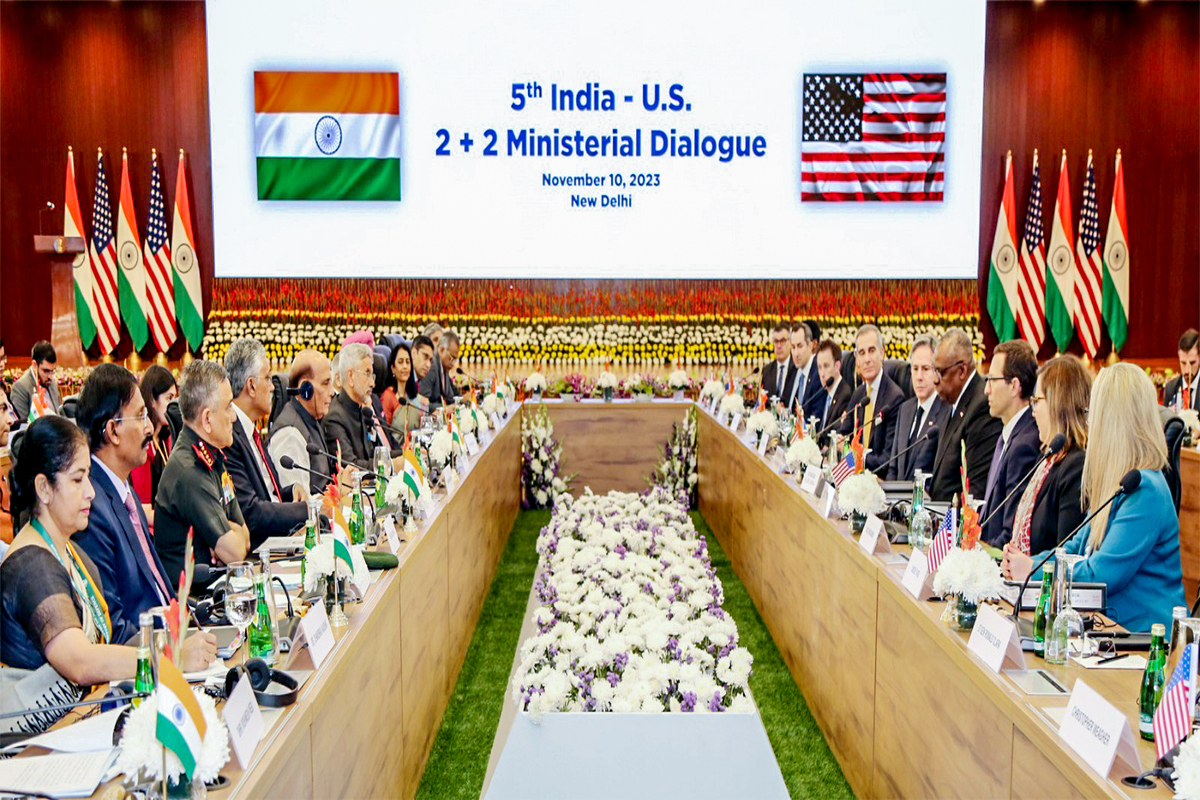India conveyed to the United States its serious concern over the activities of ‘Khalistan’ elements in Canada in the context of the ongoing India-Canada diplomatic row as the two countries discussed the Israel-Hamas conflict and steps to strengthen cooperation on key strategic issues, including countering China’s aggressive behaviour in the Indo-Pacific, at the ‘2+2’ ministerial dialogue here on Friday.
Defence Minister Rajnath Singh and External Affairs Minister S Jaishankar led the Indian side at the dialogue while the American delegation was headed by Secretary of Defence Lloyd Austin and Secretary of State Antony Blinken.
Advertisement
”The India-US defence relationship has evolved into a strategic partnership characterised by mutual trust, shared values, and a growing recognition of common interests in maintaining regional and global security. We increasingly find ourselves in agreement on strategic issues, including countering China’s aggression, promoting a free and open Indo-Pacific and addressing regional security challenges. We share a focus on maritime security in the Indo-Pacific region, recognising the criticality of safeguarding vital sea lanes and promoting stability, our teams are working on the substantive outcomes,” Rajnath said in his remarks at the meeting.
He said the strategic convergence between the two countries should guide them to new domains and expand the scope of collaboration. ”We are charting new pathways of cooperation by pursuing stronger defence, industrial engagement, easing of technology restrictions, resilient supply chains in all domains, and maritime security,” he added.
Responding to Rajnath’s remarks, US Defence Secretary Austin said, “We made a tremendous stride forward in our defence partnership over this past year, including the US-India Defence Industrial Cooperation Roadmap and we concluded that roadmap during my visit in June and in just five short months, we’ve made significant progress on that roadmap and our operational cooperation is also moving from strength to strength. Our militaries are conducting increasingly complex exercises and building greater interoperability across all domains.”
In a post on X after the meeting, Jaishankar said, “Followed up on PM Narendra Modi’s State visit to the US this June. Our agenda covered advancing our strategic partnership, including elevating our defense ties, moving forward in space & tech, future logistics cooperation, and people-to-people contacts.”
Briefing reporters after the meeting, Foreign Secretary Vinay Kwatra said in the context of bilateral relations the two sides focused on trade & investment; critical & emerging technologies, space, mineral security, value chains, supply chains and combating terrorism. In the regional context, the focus was on growing cooperation on connectivity, India-Middle East-Europe Economic Corridor, Quad cooperation, Indo-Pacific partnership and India’s leadership of the Global South.
Asked if the tensions between India and Canada figured at the meeting, Kwatra said India has consistently explained its position in full detail to all its partners. ”We have our security concerns, including the recent video of (designated terrorist) Gurpatwant Singh Pannun. We have made our position very very clear,” he added.
Relations between India and Canada touched a new low recently after Canadian Prime Minister Justin Trudeau alleged involvement of Indian agencies in the killing of ‘Khalistan’ supporter Hardeep Singh Nijjar, without providing any evidence to substantiate his charge. Pannun, founder of the banned Canada-based Sikhs for Justice (SFJ), recently asked people to avoid taking Air India originating from and terminating in Canada after November 19 as their ‘lives may be in danger’.
On the Israel-Hamas war, the two Indian ministers told the American side that India favours a two-state solution to the crisis and desired that humanitarian assistance must reach those affected by the conflict. India also condemned civilian casualties in the conflict.











